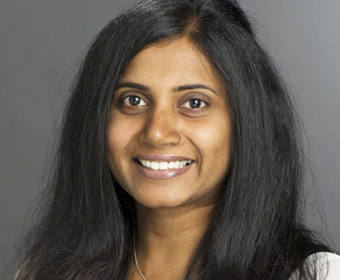
- Research
- Innovation
The UTSA Academy of Distinguished Researchers has inducted Dhireesha Kudithipudi, whose innovative research program is focused on artificial intelligence (AI), specifically brain-inspired algorithms and neuromorphic computing.
Kudithipudi is UTSA’s Robert F. McDermott Endowed Chair in Electrical and Computer Engineering and the founding director MATRIX: The AI Consortium for Human Well-Being. The consortium is fostering partnerships with industry leaders to address critical questions in artificial intelligence research and develop solutions that promote human well-being. She is also the director of the Neuromorphic Artificial Intelligence Laboratory in the Margie and Bill Klesse College of Engineering and Integrated Design.
“I am most impressed by Dhireesha’s approaches to developing brain-inspired computing systems that solve real-world problems.”
Kudithipudi was nominated by JoAnn Browning, dean of the Klesse College, and supported by a recommendation from David Akopian, the college’s associate dean for research.
Akopian and Kudithipudi worked together to establish a research collaboration with the United States Army Research Laboratory and submitted a National Science Foundation AI Institute proposal. During the course of these discussions, Akopian has been inspired by Kudithipudi’s grasp on the theory of neuroscience, computational modeling, neuromorphic engineering and the physics of emerging devices, and AI models that give her a unique strategic advantage as a researcher in this field.
“This nomination was unquestionable as I am most impressed by Dhireesha’s approaches to developing brain-inspired computing systems that solve real-world problems. The research led by her on neuromodulation in deep learning models, context-modulation in convolutional neural networks, dynamic programming of spiking neural networks, neuromorphic accelerators and hardware have shaped and helped several other studies, and extended the understanding of brain inspired systems,” Akopian explained. “Dhireesha is a pivotal voice in the field of AI.”
Sponsored by the UTSA Knowledge Enterprise, the private induction ceremony will take place on Thursday, November 3.
Since arriving at UTSA in 2019, Kudithipudi has received more than $2.3 million in funding award from various federal agencies including Argonne National Laboratory, National Science Foundation, Rochester Institute of Technology, San Antonio Medical Foundation, Sandia National Laboratories, Seagate Technology LLC, the San Antonio Partnership for Precision Therapeutics and the U.S. Air Force.
She is a co-PI on an $18M federal research contract with the Air Force Research Laboratory to accelerate research and development in strategic areas beneficial to both organizations.
In spring of 2022, Kudithipudi was the lead author of “Biological underpinnings for lifelong learning machines,” which was published in Nature Machine Intelligence, in collaboration with 22 other universities with Defense Advanced Research Projects Agency (DARPA) funding, in support of DARPA’s Lifelong Learning Machines (L2M) program, which awarded Kudithipudi substantial funding.
The paper is a comprehensive perspective on biological processes of lifelong learning and a vision for how these can be used to guide design of artificial systems. The fundamental question this paper addresses is whether a computer can pass for being human; can it be taught to be perceived as human by humans? This paper has become a new resource for the future of AI learning, defining how artificial systems can think, act and adapt in the real world, in the same way that human do. Her research in making machine intelligence adaptable was also featured in the Nature Outlook article, “Learning Over a Lifetime.”
Kudithipudi was also a plenary speaker at Nature Machine Intelligence’s conference, “AI, Neuroscience and Hardware: From Neural to Artificial Systems and Back Again” at the DZNE Campus in Bonn, Germany. Recently, her team presented their research in bio-inspired AI at Göttingen, Germany and gave invited talk at the ELLIS/CRC workshop held in Crete, Greece.
Kudithipudi believes that an AI workforce should mirror the rich diversity in society. Project LoveLace, led by Kudithipudi and funded by AMD, fills this gap by offering young women in STEM fields to engage in AI related research and curricular activities.
Induction into the academy marks the latest honor for Kudithipudi, who was recently named a fellow of Drexel University’s Executive Leadership in Academic, Technology, Engineering and Science program.
"It is an honor for our office to sponsor the Academy over the years. This year's honoree, Dr. Kudithipudi, is an exceptional researcher, educator and scholar whose leadership in AI and its associated UTSA-led research consortium has enhanced our national and international reputation as a R1 institution," said Jaclyn Shaw, interim vice president for Research, Economic Development, and Knowledge Enterprise.
The UTSA Academy of Distinguished Researchers is committed to fostering excellence in research and scholarly inquiry. Founded in 2015, the academy honors and recognizes exceptional faculty who are accomplished scholars and who share the university’s continuing commitment to research excellence.
Through a rigorous nomination process, the academy selects members who foster the highest quality of research and scholarly activity. The members, 25 to date, represent a variety of disciplines in the arts, business, engineering, humanities, social sciences and sciences.
EXPLORE FURTHER
- ⇒ Learn more about the UTSA Academy for Distinguished Researchers.
- ⇒ Explore Dhireesha Kudithipudi’s work.
The academy is chaired by Hamid Beladi, the Janey S. Briscoe Endowed Chair in Business in the Carlos Alvarez College of Business.
“Research excellence adds to our student’s knowledge base and allows the next generation of leaders to build on the intellectual discovery,” Beladi said. “The research conducted by our faculty brings the recognition and reward to our students in the classroom and reinforces the value of a world-class education. The research excellence acts as a magnet strategy as it attracts more top scholars from across the world.”

